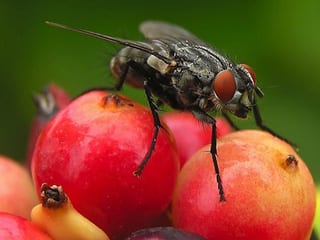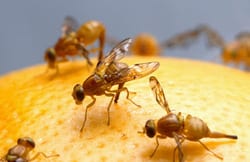The Mother Nature Network covered research carried out in the fruit fly lab of SMU biologist Johannes H. Bauer by Plano, Texas, high school student Ria Chhabra in its March 27, 2013, article “Organic food is good for flies, study finds.”
Bauer, an assistant professor in SMU’s Department of Biological Sciences, mentored Chhabra in her research to examine whether there would be health differences to fruit flies fed an organic diet or a nonorganic diet. Chhabra’s study found that flies fed an organic diet fared better on important health tests, particularly fertility and longevity.
Read the Mother Nature Network article.
EXCERPT:
By Russell McLendon
Mother Nature Network
Fruit flies live longer and lay more eggs when they eat organic food, according to a study published by university researchers and an ambitious Texas teenager.After listening to her parents debate the benefits of buying organic food, Ria Chhabra decided to take matters into her own hands. The Texas high-school student — along with biology researchers from Southern Methodist University — began studying how an organic diet affects the health of fruit flies, hoping to shed light on potential benefits for people.
Fruit flies and humans have lots of obvious physiological differences, but the insects are still common test subjects for studying human health, since about 77 percent of known human disease genes have a relevant match in the fruit-fly genome. And based on Chhabra’s research, both species may have a lot to gain by eating more organic food.
“To our surprise, in the majority of our tests of flies on organic foods, the flies fed organic diets did much better on our health tests than the flies fed conventional food,” says SMU biologist Johannes Bauer, who served as Chhabra’s mentor, in a press release. “Longevity and fertility are the two most important aspects of fly life. On both of these tests, flies fed organic diets performed much better than flies fed conventional diets. They lived longer, had higher fertility, and had a much higher lifetime reproductive output.”
That’s a promising result, but as Chhabra points out, it’s still unclear why exactly the organic-fed flies turned out healthier.
“We don’t know why the flies on the organic diet did better,” says Chhabra, a student at Clark High School in Plano, Texas. “That will require further research. But this is a start toward understanding potential health benefits.”
Read the Mother Nature Network article.
Follow SMUResearch.com on Twitter.
For more information, www.smuresearch.com.
SMU is a nationally ranked private university in Dallas founded 100 years ago. Today, SMU enrolls nearly 11,000 students who benefit from the academic opportunities and international reach of seven degree-granting schools. For more information see www.smu.edu.
SMU has an uplink facility located on campus for live TV, radio, or online interviews. To speak with an SMU expert or book an SMU guest in the studio, call SMU News & Communications at 214-768-7650.


 Fruit flies fed organic diets are healthier than flies fed nonorganic diets, study finds
Fruit flies fed organic diets are healthier than flies fed nonorganic diets, study finds Center for Creative Leadership to study innovative learning method of SMU Lyle School of Engineering
Center for Creative Leadership to study innovative learning method of SMU Lyle School of Engineering Parenting program tackles child abuse and neglect among formerly homeless families
Parenting program tackles child abuse and neglect among formerly homeless families


 Hiding in plain sight: How invisibility saved New Mexico’s Jicarilla Apache
Hiding in plain sight: How invisibility saved New Mexico’s Jicarilla Apache